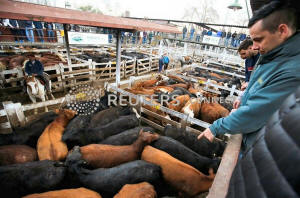Exclusive: Where's the beef? Argentine ranchers hope more is headed for
China
 Send a link to a friend
Send a link to a friend
 [September 18, 2019]
By Maximilian Heath, Dominique Patton and Hugh Bronstein [September 18, 2019]
By Maximilian Heath, Dominique Patton and Hugh Bronstein
BUENOS AIRES/BEIJING (Reuters) - Cattle
ranchers in Argentina, which recently edged out neighbor Brazil as the
top exporter of beef to China, are hoping to build on that status by
getting more local meatpacking plants approved by Beijing, industry
officials and other sources told Reuters.
An Argentine industry group is currently in China looking to promote the
South American country's famed T-bone steaks and sirloins, while Chinese
teams have recently inspected Argentine local meat plants, the sources
said.
The push, after a massive spike in Argentine beef exports to the world's
No. 2 economy this year, underscores how China is looking to diversify
its protein supply, shaking up the global meat trade as African swine
fever hammers its domestic hog herd.
It is also an important windfall for Latin America's No. 3 economy,
which is battling to get out of a deep recession and facing a swirling
debt crisis ahead of elections in October that will likely usher in a
new government.
Argentina, which traditionally exports cheaper cuts to China, saw its
beef sales to the country more than double to $870 million in the first
seven months of the year, data from its official INDEC statistics agency
shows.

Chinese customs data show that amounted to around 185,604 tonnes of
Argentine beef, giving it the top share of the Chinese import market
with 21.7%, slightly ahead of Brazil's 21.03%. That volume was a jump of
129% against the year before.
Santiago del Solar, chief of staff to Argentina's agriculture minister,
told Reuters there were many slaughterhouses up for approval and that
China was working closely with Argentine food safety body Senasa.
"We will have news in the coming months about more pork, poultry and
beef slaughterhouses being approved for China," he said, adding Senasa
was doing some inspections on behalf of China using an "honor system."
CHINA'S TIME FRAME
Argentina's ranchers are now looking for more. A trade delegation is
currently in China meeting with potential buyers of the country's meat,
an industry official with knowledge of the meetings told Reuters.
The person added that a Chinese team had also recently traveled to
Argentina to visit local meat plants.
[to top of second column]
|

A cattle trader points at cattle for sale inside corrals at the
Liniers market, in Buenos Aires, Argentina August 27, 2019.
REUTERS/Agustin Marcarian/File Photo

"The Chinese were there last week in Buenos Aires, they were doing
inspections and made good progress. The plants issue is pretty good,
but with China they make approvals when they want to do it," he
said.
"We are optimistic with the results. It seems they didn't find
anomalies, but yes, it depends on the time frame of the Chinese."
The progress comes after China granted export licenses to 25
Brazilian meatpacking plants earlier this month. Brazil has also
seen a surge in meat demand from China.
China's General Administration of Customs, which approves new
imports, also recently gave the green light to imports of soymeal
from Argentina, following decades of talks between the two
countries.
The customs body did not immediately respond to a faxed request for
comment from Reuters asking about new Chinese approvals for
Argentine meat plants.
A second person, a manager at a state-owned Chinese trading house,
said he had met with an Argentine firm last week during the
delegation's visit. He declined to name the firm, which had met with
China customs officials, but said it had already been approved for
exports and was seeking further plant approvals.
Miguel Schiariti, president of the CICCRA meat industry chamber,
said a Chinese team had also recently done a video-conference
inspection of an Argentine plant alongside Senasa, with the aim of
approving the facility for export.
"There are 11 meat plants ready to be approved and (the Chinese) are
doing it one by one. But approval is taking a long time," he told
Reuters.

"These places would meet the criteria for approval, but the Chinese
have always been very cautious, despite the problems they have with
pork. It seems to me that plants won't get approved before
November."
(Reporting by Maximilian Heath and Hugh Bronstein in Buenos Aires
and Dominique Patton in Beijing; Editing by Adam Jourdan and Tom
Brown)
[© 2019 Thomson Reuters. All rights
reserved.]
Copyright 2019 Reuters. All rights reserved. This material may not be published,
broadcast, rewritten or redistributed.
Thompson Reuters is solely responsible for this content. |